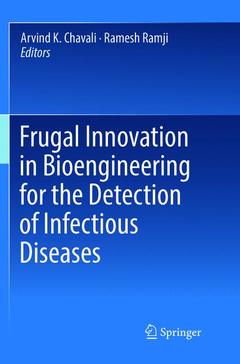Description
Frugal Innovation in Bioengineering for the Detection of Infectious Diseases, 1st ed. 2018
Coordinators: Chavali Arvind K., Ramji Ramesh
Language: English
Subjects for Frugal Innovation in Bioengineering for the Detection of...:
Publication date: 06-2019
119 p. · 15.5x23.5 cm · Paperback
Publication date: 02-2018
Support: Print on demand
Description
/li>Contents
/li>Biography
/li>Comment
/li>
This book introduces readers to the concept of 'frugal innovation' and describes novel low-cost technologies that aid in diagnosing infectious diseases. Rapidly deployable, portable, and affordable diagnostic tools have the potential to tremendously benefit populations in resource-limited settings and improve global health outcomes. Specifically, the book includes the following features:
Cutting-Edge Research: Thorough coverage of scientific advances related to frugal bioengineering that have been developed within the last few years. A few examples of technologies covered in detail include low-cost paper-based and CD-based microfluidic diagnostic systems.
Industry and Non-Profit Voices: Chapters written by scientists currently working in industry and philanthropic sectors.
Arvind is currently a postdoctoral scholar at the Carnegie Institution for Science at Stanford University, where he is investigating specialized plant metabolism for the discovery of new natural products with potential for medicinal use. Prior to Carnegie, Arvind received a doctoral degree from the University of Virginia for work on systems biology of neglected tropical diseases. He also holds a Master's degree in Public Policy from the Woodrow Wilson School at Princeton University where he studied health policy and international development. And, he spent some time at Yale University working on transcriptional regulation in the context of HIV latency. Arvind has broad interests in infectious disease and global health, and he is passionate about the use of simple and innovative technological solutions to address grand challenges in health and medicine.
Ramesh Ramji, Illumina, San Diego, CA
Dr. Ramesh Ramji is a passionate bioengineer who enjoys inventing novel platforms for clinical diagnostics, engineering, and applied sciences. He is currently a Scientist at Illumina, a company that is a leading developer and manufacturer of integrated systems for large-scale analysis of genetic variation and function. Dr. Ramji graduated from the National University of Singapore (NUS) with a PhD in Biomedical Engineering and completed two post-doctoral stints – at NUS and Yale – prior to joining Illumina. He holds five patents so far and authored several publications on integrative assay technologies.
Using innovative high throughput microfluidic techniques, he has created several analytical platforms that allow biological assays to be conducted at reduced cost and reagent consumption. He is currently an active reviewer for RSC Advances, Molecular Biosystems, Biofabrication, and Journal of Micromechanics and Microengineering. Other scientific areas such as green
Low-cost technological innovations aid in diagnosing infectious diseases
Contributions by researchers from both academia and industry
Proposes a possible future for frugal bioengineering




